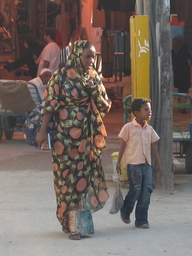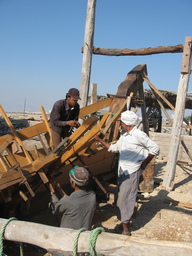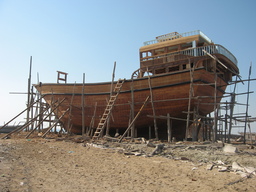
Qeshm City Bazaar
 Qeshm City Bazaar |
There must be something therapeutic about the scent of the sea. Just walking along the shoreline, tasting the salt air, I feel re-energized. This is my second night on Qeshm, an island located near the mouth of the Persian Gulf.
In addition to having that balmy, relaxed atmosphere which seems inherent to sub-tropical islands everywhere, the local culture also differs starkly from what I've experienced across other parts of the country. Many people around Qeshm have a darker complexion than people have in the north. If I didn't know otherwise, people's appearances might lead me to believe that I was somewhere on the continent of Africa, rather than in a remote corner of Iran.
As elsewhere throughout the country, the women I've seen around Qeshm remain covered from head to toe. Rather than the plain black sheets that dominate everywhere else in Iran, vibrant colors are the rule for both leggings and outer garments. Many of the women around the Gulf cover their faces with a unique style of mask--also not a custom I've seen anywhere else around Iran. A flat piece of sturdy cloth folds into two halves around the bridge of the nose, slits above the eyes allow the woman to see out. My first impression of these masks was that they looked like colorful beaks; I wasn't bold enough to approach anybody who was wearing one to ask for a photograph.
I spent this afternoon visiting Laft, a village halfway across the island from the city of Qeshm, where I am staying. Laft has retained traditions that are falling to modernization elsewhere around the Gulf. Today, a chain of hills divides Laft into an old side and a new side, two small patches of buildings with opposing character. The side closest to the Gulf waters is clearly the original part of the city. It's in that part of town that cobblestone lanes run between old buildings, dogs snooze in the shade, and a covered reservoir halfway uphill is still the place to go to fetch water.
 Dhow Builders |
We wound up talking for much longer than I initially expected we would. Over the course of our conversation I found that it apparently takes a full year to finish constructing a dhow. (I believe each crew has several boats in different stages of completion at any given moment, they're not focusing their entire effort into one vessel per year. I think.)
When my abilities speaking Persian failed, the foreman surprised me, asking whether I knew Arabic or Urdu. I found his question unexpected as I actually do have a limited familiarity with both languages. In retrospect, it seems obvious that somebody building a boat in the island town of Laft would see Arabic and Urdu as natural choices to fall back on as a shared second language. The northern peninsula of Oman can't be more than a few hours away, even drifting by lazy dhow. Exiting the Persian Gulf, it's smooth sailing just across the Arabian Sea to Karachi.
One thing I've learnt through experience in recent years: it doesn't matter how rudimentary my abilities are in any language. If the listener tries to understand what I'm saying, we will communicate fully. If the person I'm speaking with doesn't make an effort, we will likely have a short conversation, even in a language which I have studied for some time. This time I had a patient listenter. We continued our conversation in Urdu, which--while greatly increasing our communication--still allowed a timespan that could be measured in minutes. It's funny to watch myself trying to code-switch, falling down between two different languages, neither of which I am fluent in. In spite of this, we did manage to communicate for a fair while: chatting, sipping sweet tea, and talking about boats.
 Nearly Completed Dhow |
From Laft I hitched a ride back to the small city of Qeshm. Walking to my hotel, I stopped into a shop with several blenders and baskets of fruit. A large sign in Persian announced "abmiva"--fruit juice. My language capabilities again fell down quickly. After enquiring which fruits were in season I struggled to understand what the options were. Seeing my lack of comprehension, the man behind the counter asked a familiar question:
"So... do you speak Arabic or Urdu?"